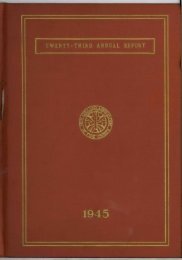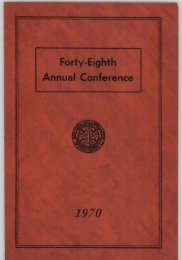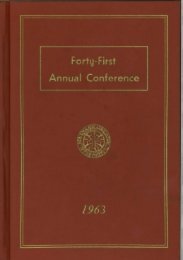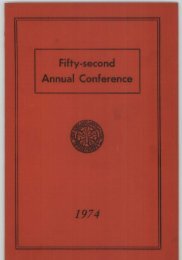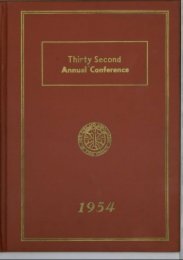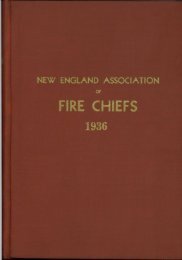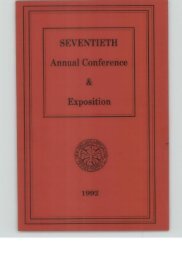NEAFC 31st Annual Conference.pdf - New England Association of ...
NEAFC 31st Annual Conference.pdf - New England Association of ...
NEAFC 31st Annual Conference.pdf - New England Association of ...
You also want an ePaper? Increase the reach of your titles
YUMPU automatically turns print PDFs into web optimized ePapers that Google loves.
NEW ENGLAND ASSOCIATION OF FIRE CHIEFS<br />
sistently bad fire record we do retire from the risk. Now we have no way <strong>of</strong> educating<br />
that fellow, and whether it has any influence on him I can’t say.<br />
I had another question submitted from the floor, and I am going to ask Harold<br />
Estabrook <strong>of</strong> the Aetna Insurance Company to answer it. This is a divided question.<br />
One, are steam-boiler explosions covered by comprehensive policies covering homes<br />
against fires, windstorms, etc.? And’, two, if not, how can such coverage be secured?<br />
MR. ESTABRoOK: There are two forms <strong>of</strong> explosion insurance. One is steamboiler<br />
insurance, which is a form <strong>of</strong> in.surance itself. The second is normal explosion<br />
that could be found and is so-called inherent in a piece <strong>of</strong> property. Most dwellings<br />
have gas in their homes. An explosion can develop from the presence <strong>of</strong> gas. Such an<br />
explosion is covered under exten.ded .coverage, and accidental explosion, like gun-powder.<br />
Your boiler insurance is covered under boiler insurance specifically and~ is excluded<br />
under .c.ur extended coverage contract. It can be purchased as a separate rate policy and<br />
would be covered under your policy. Does that satisfy the questioner?<br />
CHAIRMAN F, RSKINE" I wonder if any other members <strong>of</strong> the Panel would like to<br />
talk on this.<br />
MR. WF.ST~RV~.*.T: I want to bring out very strongly this, that there is an honest<br />
estimate <strong>of</strong> lcss on any fire. When the policyholder or building owner arrives at the<br />
amount <strong>of</strong> damage that was done and the adjuster separately and independently sets<br />
up a figure that is close together, nobody is trying to rob the other. On the other hand,<br />
the public adjuster is trying to get as much as he can out <strong>of</strong> the same fire. The third<br />
is indemnity.<br />
If you lose a ro<strong>of</strong> in a windstorm and that rc<strong>of</strong> is twenty years’ old, there is very<br />
little value in that ro<strong>of</strong> and yet some <strong>of</strong> these men will try to get a new ro<strong>of</strong> for one<br />
that is worn out. Our adjusters have no interest in cutting down the amount <strong>of</strong> any<br />
recovery. Our men are taught in school that we have only one basis <strong>of</strong> adjusting a claim,<br />
and that is, what it is actually worth. I will grant you there are times where the<br />
difference <strong>of</strong> opinion is so much that it takes cooler heads to solve it, but generally<br />
speaking, if an adjuster employs a contractor and the owner employs another contractor,<br />
they are going to come out at a reasonable close figure and a public adjuster Concerned<br />
with getting more than the policyholder is entitled to, something is wrong somewhere.<br />
I suspect that there are occasions <strong>of</strong> people who are trying to get something out <strong>of</strong> someone<br />
else’s misfortune.<br />
CHAIRMAN ERSKINE: Are there any other questicns? I have a card here, "How<br />
can the Fire Chief assist the school in planning fire drills? ’’<br />
MRS. CURLEY: At the beginning <strong>of</strong> every school year it is the duty <strong>of</strong> the school<br />
principal to plan a fire drill. Often he has had enough experience to be able to plan a<br />
good fire drill by himself, *but I am sure if he would call upon some <strong>of</strong> you men to.<br />
help him plan his fire drills they would~ be better. I have observed in my travels over<br />
Massachusetts in several places they have put on fire drills for me and as the children<br />
filed out and tok their positions in the school yard I have asked this question. Where<br />
does the fire apparatus come in? And the principal would say, this direction or that<br />
direction, and immediately he says, "Why the fire apparatus would have to cut right<br />
through those lines .c.f child,ren." I think he could take your advice as to where to station<br />
the children when they leave the building.<br />
157



